Have you ever stumbled across Maslow’s Hierarchy of Needs (you know… when you’re not fishing)? It’s strolled into my periphery various times in my past, and recently brought itself front and centre during some study into social inclusion. And that’s when it struck me: This is why our fishing resonates so deeply with us all! Check this out…
Ticking All The Wellbeing Boxes—From Survival to Self-Actualisation
In this modern whirlygig we now call life — with its unrelenting digital alerts ricochetting around the concrete landscapes we inhabit, we rarely dig deep to find reasons for the relief we find at the edge of a tranquil river or lost in a vast expanse of blue, rod in hand. The relief is palpable, and the reason seems a no-brainer. No further research required.
And I’ll be honest, I wasn’t looking for a reason when Maslow’s little triangle popped up in a slide show… but there it was: a backlit epiphany so clear that I lost my spot in the lecture!

Jo Starling finds it difficult to disconnect from digital demands. Fishing provides the perfect opportunity to unwind while still feeding her need for focus-driven activity.
What makes rec’ fishing so addictive for enthusiasts like me? When explored through the lens of Abraham Maslow’s Hierarchy of Needs, the answers pulse like an adrenalin-fuelled heartbeat! This triangular model — developed by one of the 20th century’s most cited and respected psychologists to help humanity understand mental health needs — may as well map the motivational journey of an “avid”.
At the very base of Maslow’s pyramid are the physiological needs — essential elements for human survival such as food, water, and shelter. Fishing directly satisfies these foundational needs by not only providing the means to secure fresh, nutritious food but also equipping us with life skills like knot tying. Should the I ever have the need, I’m confident in my ability to lash together a shelter, catch a fish and protect myself and my family from the ravages of exposure… all by using the fishing experiences gathered thus far in my journey.
TICK. Fishing has just padded out our base.
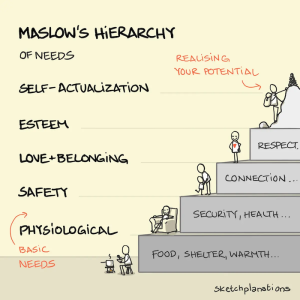
[Image: Jono Hey, Sketchplanations]
Participating in fishing extends our basic sustenance to even greater health benefits by providing access to highly nutritious food. It also pushes us into physical activity levels that maintain mobility (at the very least). Moreover, fishing bridges generational gaps, keeping extended families engaged and connected through shared experiences. The quieter times allow us to create unique bonds harking back to a simpler time when society didn’t inherently barricade opportunities for “quality time”. These stronger relationships and deeper connections provide emotional safe-havens that can often be difficult to find.
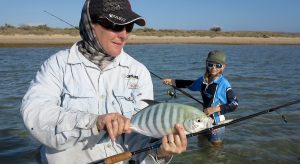
Sharing moments like this first-sight of a chevron trevally provided an adventurous, rich and memorable family experience for Jo and daughter Charlotte (shown here in Exmouth, 2012).
Social belonging, the third tier, builds further on this human need for connection with others. Beyond our inner circle, fishing provides a vibrant community of like-minded individuals. We naturally gravitate to others who are happy to trade glory stories and post-mortems. We find these fabulous folk scattered through all walks of life, providing us with a rich and colourful social tapestry. Our sport also fosters a sense of belonging and acceptance — whether through spontaneous conversations on the water or in the tackle shop, or structured involvement in organisations like my beloved Women’s Recreational Fishing League, where mentorship and friendships flourish, enriching our lives beyond the last cast.

A few members of WRFL enjoy a toasty bevvie at the first “Learn to Fly” enclave at Dunmore Trout Waters, NSW. Women from all over the east coast together for a dabble with the fly rod… and a whole lot of laughs.
Just like fishing, ascending through Maslow’s hierarchy is a journey — attaining each tier allows us to progress to the next. We’re now up to the esteem level. I’m not going to break the internet by announcing that fishing provides profound personal satisfaction. The pride that comes from mastering a baitcaster or getting your fly line to unfold perfectly, the joy of sharing new fishing adventures, and the respect earned from peers when you land something meritorious: these are all immensely beneficial to our esteem, be it respect earned from others, or self-esteem.
I’ve always found that the latter is the most powerful in the esteem tier. Earning respect from others is fabulous. Accolades always make you feel incredible, but that rush can fade as quickly as it swells. Genuinely positive self-esteem is the real stuff. That’s the gold… and fishing holds the key to building it to an immensely healthy, unshakeable level.
Taking the skills we learn, either from others or from experience itself as we spring along our journey — and innovatively applying them to improve our success rates — enhances self-esteem in powerful ways. Each personal adaptation and creative technique refined through experience helps to build a sense of owned mastery and individuality in the sport. And of course, doing our own part to pass on our knowledge feeds right back to our second tier and bubbles up through, strengthening our personal pyramid ever more — fostering gratitude and respect (esteem) and making us feel awesome about ourselves (self-esteem).
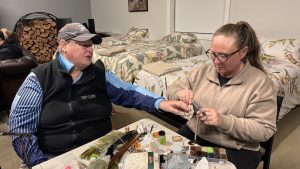
Laurie Anderson passes on some fly tying tips to first-timer Tracey Andersen. A very positive energy exchange happens when two people share this level of focus and quality time.
At the pinnacle, we find self-actualisation. Passing on our passion and skills to others, nurturing a cycle of learning and giving that fulfils our need for purpose and personal growth. Through teaching, we not only affirm our own skills but also contribute to the community’s wealth of knowledge — encouraging new generations to continue our cherished traditions.
But there’s more to this top tier. It’s about living up to our potential.
Rec’ fishing affords the opportunity for every human — regardless of circumstance or income — to fulfil their potential in the sport, whether that be rising to the top one percent, or consistently providing top quality nutrition for the kids.
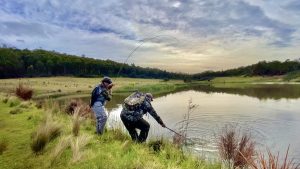
Magical moments like this are abundant in a fisho’s life. The world would be a better place if more people knew and valued the power of rec’ fishing.
Now that we’re standing at the top of the pyramid, I think I can rest my case. Fishing is more than a pastime — it’s a comprehensive dance with life that meets and exceeds the spectrum of human needs outlined by Maslow in his widely accepted model for human wellbeing. From satisfying basic survival skills to fostering communities and encouraging personal and communal growth, it’s clear why we are irresistibly drawn to the water. Fishing has never been about just filling the esky for a great many of us; it’s about filling the soul.
Now… where’s my honorary doctorate 😉
Until next time… FISH ON!

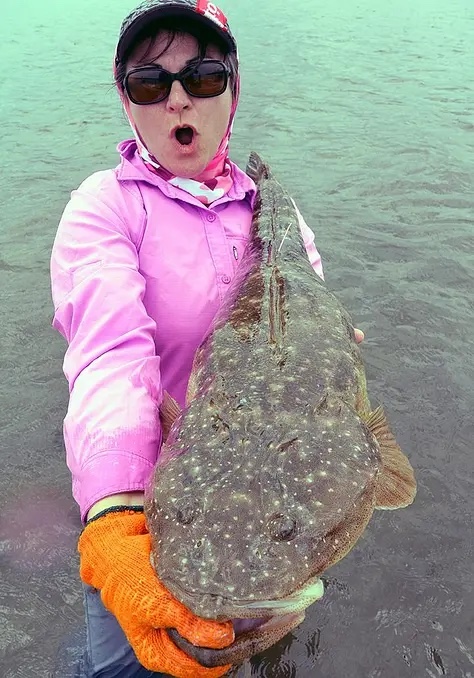
For three decades Jo has worked with businesses and personalities, helping them to promote themselves in one form or another, whether through graphic design, advertising, promotions or marketing.
She has owned a fishing rod for just as long, but it’s only been in this new century that it hasn’t been allowed to gather dust.
Jo is a passionate advocate for the sport of fishing and its promotion as a healthy lifestyle for women.
To find out more about Jo visit her website HERE
Or you can visit her Fishtopia Web site HERE or on the banner below.
Jo is also the founder and National President of the Women’s Recreational Fishing League (WRFL) Inc. The work they do is very important in balancing the participation ratios of fishing in Australia, thus making the collective voices of Aussie anglers more harmonious and powerful, as well as shoring up the economy of the sector. For more information visit their Website at womensrecfishingleague.org










